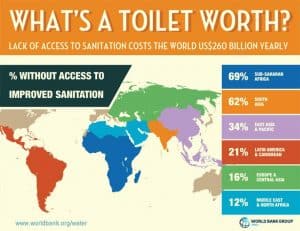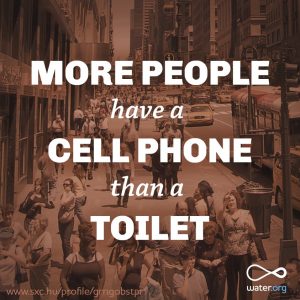World Water Day falls on March 22 each year, and serves as a time to celebrate all things water. It is also a time to acknowledge water’s pivotal role in our daily lives, to recognize the global population that still lacks access to adequate water supply and sanitation, and to focus on sustainability so that we can protect our world’s most precious resource. While most of us recognize that water is essential to life, many of us don’t realize that water is just as essential to our economy and is responsible for employing half of the world’s workers, or 1.5 billion people. And while half of the world’s workers are directly employed in water-related sectors, a majority of the other half are also reliant upon water for their jobs. The theme for World Water Day 2016 — Better Water, Better Jobs — reflects this reality.
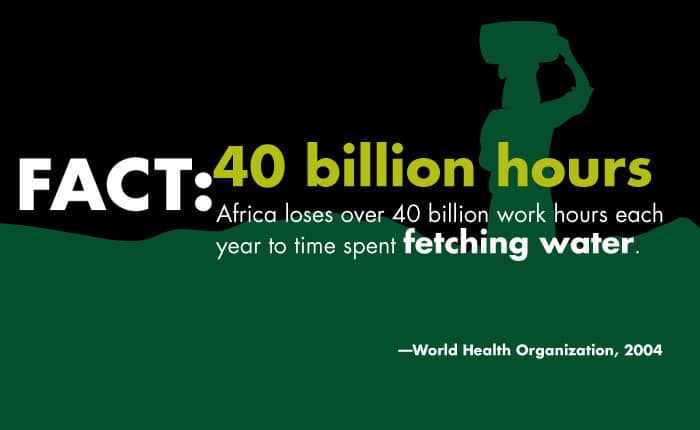 First, let’s look at some facts:
First, let’s look at some facts:
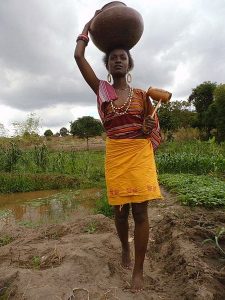 663 million people — or 1 in 9 — don’t have access to safe drinking water.
663 million people — or 1 in 9 — don’t have access to safe drinking water.- The average American uses about 100 gallons of water a day, which is 10 times more water than the average rural resident in sub-Saharan Africa.
- In Africa and Asia, women and girls walk an average of 3.5 miles a day carrying water that weighs more than 40 pounds, or the equivalent of carrying two cases of soda.
- Each day people, mostly women and girls, spend 125 million hours collecting water.
- 66 children die from diarrhea from water-related disease every hour.
- Globally, one third of all schools lack access to sanitation and drinkable water.
- 160 million children suffer from malnutrition, which has lifelong impacts on health, education, and economic potential; 50% of this malnutrition is directly linked to lack of clean water and sanitation.
And thankfully, some really good news:
- 2.6 billion people have gained access to improved drinking water since 1990.
- 2.1 billion people have gained access to an improved sanitation facility since 1990.
- Over 90% of the world’s population now has access to an improved water source.
- Since 2008, more than $27 million federal dollars have been invested in projects to build up water distribution systems in Navajo Nation, which will will allow about 800 homes to benefit from new pipe systems and improve water quality for about 1,000 homes that already have running water.
Quality and availability of water have a direct effect on peoples’ lives, including workers. Yet millions of people who work in water are not recognized or protected by basic labor rights, and do not have an adequate clean water supply. In fact, over 340,000 of the world’s workers die each year from lack of clean water and sanitation. Many of the world’s workers, including farmers and fishermen, depend wholly on water for their livelihoods. Also, women and girls in developing countries are typically responsible for fetching water, often from miles away, which leaves them no time for education or employment. The adequate quantity and quality of water can significantly change workers’ lives and livelihoods, and can even improve societies and economies.
 Water is also an integral part of our jobs here at Tata & Howard. As a water engineering firm, we strive to improve our water supply and to create a safe, sustainable future for generations to come. As we have recently seen in communities like Flint, Michigan and Sebring, Ohio, unsafe water directly affects the health of both residents and the economy. We accept that it is our diligent duty to provide the most efficient and meticulous engineering service to municipalities and water companies to safeguard our nation’s water supply and the health of residents. We work cohesively as a team to foster innovation and to provide a series of checks and balances, while each and every project on which we work is technically reviewed by a senior engineer not associated with the project.
Water is also an integral part of our jobs here at Tata & Howard. As a water engineering firm, we strive to improve our water supply and to create a safe, sustainable future for generations to come. As we have recently seen in communities like Flint, Michigan and Sebring, Ohio, unsafe water directly affects the health of both residents and the economy. We accept that it is our diligent duty to provide the most efficient and meticulous engineering service to municipalities and water companies to safeguard our nation’s water supply and the health of residents. We work cohesively as a team to foster innovation and to provide a series of checks and balances, while each and every project on which we work is technically reviewed by a senior engineer not associated with the project.
In addition to our daily work, we actively support numerous water organizations, including Water For People, whose goal is to bring a clean, sustainable drinking water supply to everyone forever, and the Navajo Water Project, which works diligently to bring safe, accessible drinking water to the residents of Navajo Nation. It is our belief that safe water is a basic human right, and through our work and our works, we actively sustain that belief.
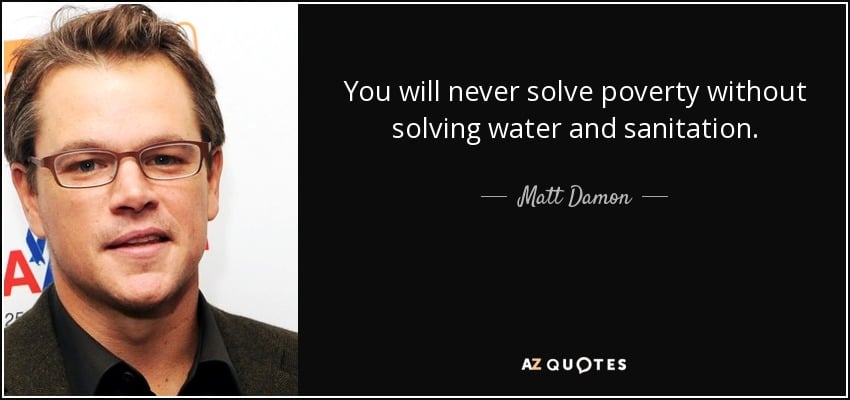 On World Water Day, we invite you to join the 2016 campaign to get informed, engaged, and take action. There are many ways to get involved. Visit the Environmental Protection Agency’s website to learn about water, or make a donation to a reputable water charity. Water For People, Charity: water, Navajo Water Project, and Matt Damon’s water.org are all water charities with superior ratings. You can also contribute on social media by using the hashtags #WaterIsWork and #WorldWaterDay. Together we can help the people of the world to have an adequate supply of safe drinking water, improving the health of workers, the economy, and our environment.
On World Water Day, we invite you to join the 2016 campaign to get informed, engaged, and take action. There are many ways to get involved. Visit the Environmental Protection Agency’s website to learn about water, or make a donation to a reputable water charity. Water For People, Charity: water, Navajo Water Project, and Matt Damon’s water.org are all water charities with superior ratings. You can also contribute on social media by using the hashtags #WaterIsWork and #WorldWaterDay. Together we can help the people of the world to have an adequate supply of safe drinking water, improving the health of workers, the economy, and our environment.


